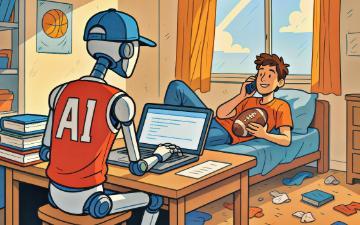As artificial intelligence continues to permeate various sectors, its influence on education is both profound and troubling. A recent discussion on Viewpoints Radio, featuring insights from Brian Patrick Green of the Markkula Center for Applied Ethics, sheds light on the complexities AI introduces into educational environments. The conversation underscores the dual nature of AI's role in education—offering potential benefits while simultaneously presenting significant ethical challenges.
Academic Integrity at Risk
One of the most pressing concerns highlighted in the discussion is the potential for increased cheating facilitated by AI technologies. Tools like ChatGPT, which can generate human-like text, are being used by students to complete assignments, raising questions about the integrity of academic work. This not only undermines the educational process but also poses a challenge for educators who must adapt to these new realities.
"The rise of AI in educational settings is a double-edged sword. While it can enhance learning experiences, it also makes it easier for students to bypass the learning process altogether," said Brian Patrick Green, emphasizing the need for vigilance and adaptation in educational policies.
Declining Student Engagement
In addition to academic dishonesty, AI's presence in education could lead to declining student engagement. As students become more reliant on AI for completing tasks, their motivation to engage deeply with the material may diminish. This trend threatens to erode critical thinking skills and reduce the overall quality of education, as students may prioritize convenience over genuine understanding.
Ethical Implications in the Workplace
The conversation also touched on the broader implications of AI in the workplace, particularly concerning ethical considerations. There is a growing need for thoughtful integration of AI technologies, guided by frameworks like the ITEC Handbook, to ensure that these tools are used responsibly. Special attention is required to address how AI might disproportionately affect women and other marginalized groups in professional settings.
As AI continues to evolve, it is imperative that educational institutions and workplaces alike develop robust ethical guidelines to navigate this new landscape. Without such measures, the promise of AI could be overshadowed by its potential to disrupt and degrade educational and professional standards.
Originally published at https://www.scu.edu/ethics/about-the-center/center-news/is-artificial-intelligence-destroying-education/
ResearchWize Editorial Insight
The article highlights crucial challenges AI presents to education, making it essential reading for students and researchers. AI's role in facilitating academic dishonesty raises urgent questions about maintaining academic integrity. As AI tools like ChatGPT become more prevalent, how can educational systems evolve to ensure genuine learning?
The potential decline in student engagement is another pressing issue. If students lean on AI for convenience, what happens to critical thinking and deep learning? This trend could fundamentally alter the educational landscape, impacting the quality of future professionals.
Ethical considerations extend into the workplace, where AI's integration could disproportionately affect marginalized groups. This underscores the need for ethical frameworks, like the ITEC Handbook, to guide AI's responsible use.
For researchers, the article suggests a rich field of study in AI's long-term impact on education and ethics. What systemic changes are necessary to harness AI's benefits while mitigating its risks? The stakes are high, and the time for action is now.
Looking Ahead
1. AI Literacy as a Core Curriculum Component
Education must evolve to include AI literacy as a foundational element, akin to reading and mathematics. This isn't just about teaching students how to use AI tools but fostering an understanding of AI ethics, biases, and societal impacts. Will schools recognize the urgency to integrate AI literacy, or will they lag, leaving students unprepared for an AI-driven world?
2. Dynamic Curriculum Overhaul
The traditional curriculum is on a collision course with rapid AI advancements. Static syllabi won't cut it anymore. We need dynamic, continuously updated learning modules that reflect the latest in AI research and application. But can educational bureaucracies pivot fast enough to keep pace? Or will students be left learning yesterday’s lessons, unprepared for tomorrow’s challenges?
3. Teacher Training: A New Frontier
Teachers are the linchpins of educational transformation, yet many remain untrained in AI technologies. Professional development programs must prioritize AI competency, equipping educators to guide students through this new digital landscape. Will governments allocate the necessary resources, or will teachers be left to navigate AI complexities alone, further widening the education gap?
4. Ethical AI Frameworks in Education
The integration of AI in education needs a robust ethical framework to prevent misuse and ensure equitable access. This involves creating policies that protect student data, promote transparency, and address algorithmic biases. If regulators fall behind, who will hold educational institutions accountable? The stakes are high, and the time for complacency is over.
5. Collaborative Partnerships with Tech Companies
Educational institutions should forge partnerships with tech companies to stay at the cutting edge of AI developments. These collaborations can provide schools with the tools and expertise needed to innovate. But how do we ensure these partnerships prioritize educational goals over corporate interests? Vigilance is key to maintaining a balance that serves students first.
6. Measuring Success in New Metrics
As AI reshapes education, traditional metrics of success may become obsolete. New indicators must be developed to assess student engagement, critical thinking, and ethical understanding in an AI-enhanced learning environment. Are educational leaders ready to redefine success, or will they cling to outdated measures that no longer reflect student achievement?
Related Articles
- AI Appreciation Day: 58% students globally use AI for studies, shows survey
- This Study Hack Turned My Notes Into An AI Podcast — Here's How It Went
- Alpha School, AI-Driven Education Founded in Austin, Is Coming to More Cities
📌 Take the Next Step with ResearchWize
Want to supercharge your studying with AI? Install the ResearchWize browser extension today and unlock powerful tools for summaries, citations, and research organization.
Not sure yet? Learn more about how ResearchWize helps students succeed.

